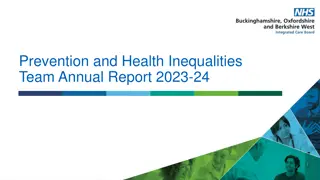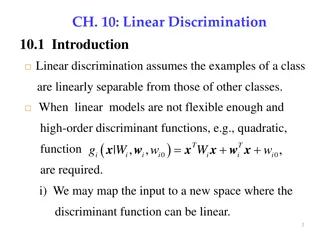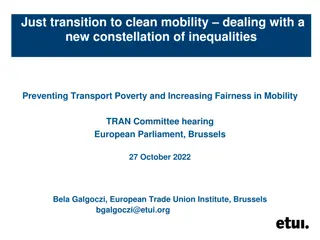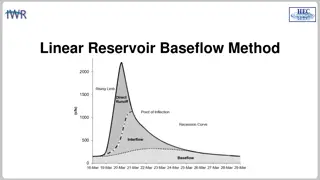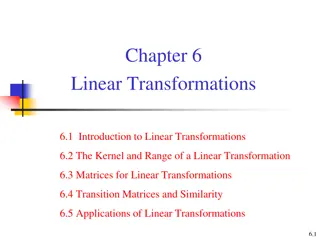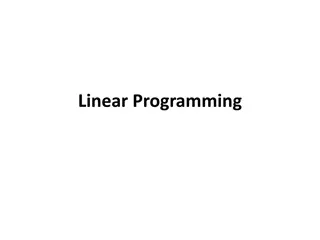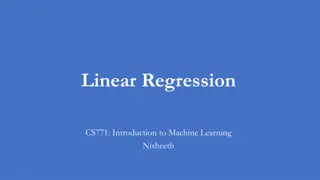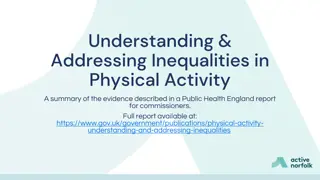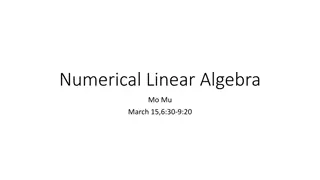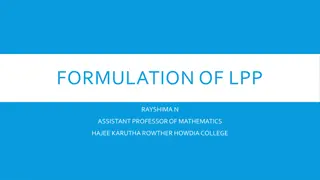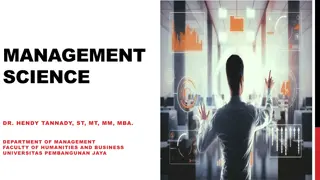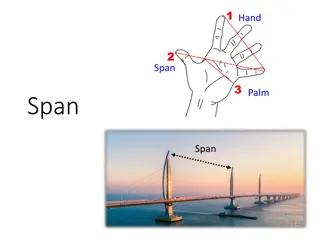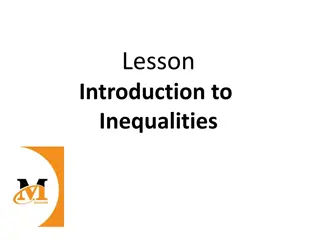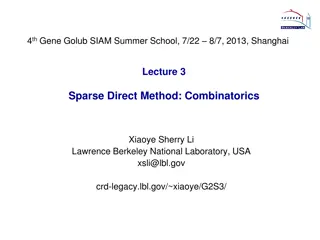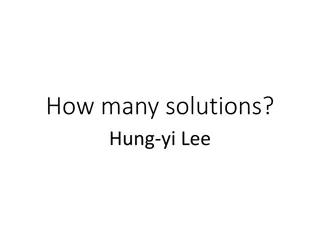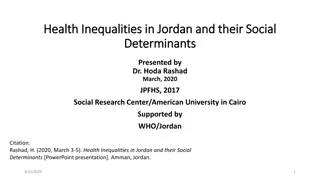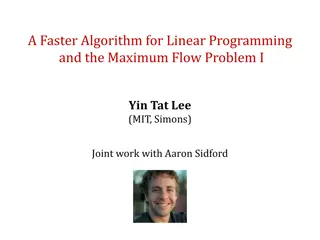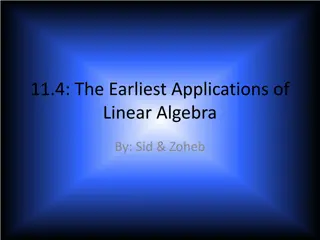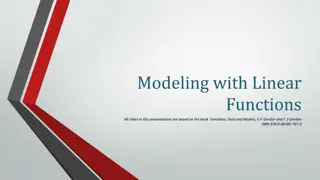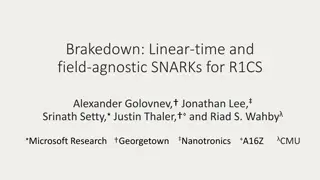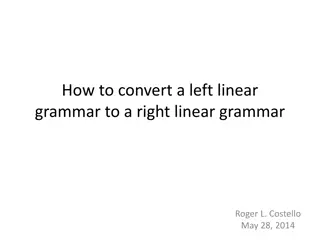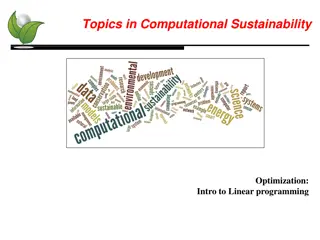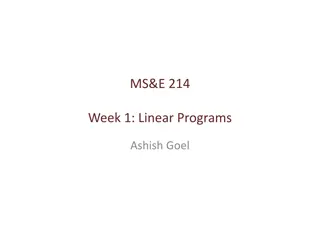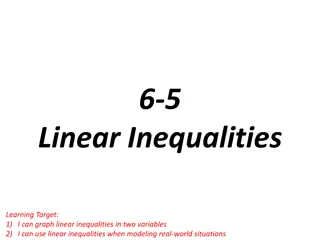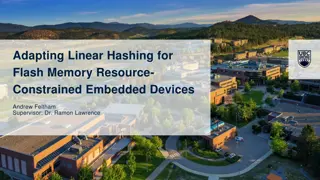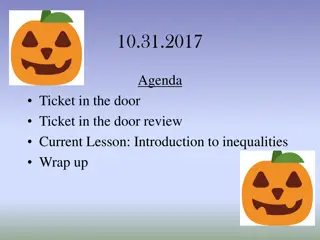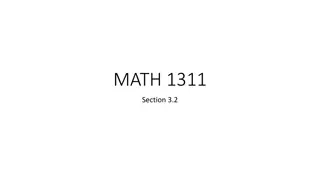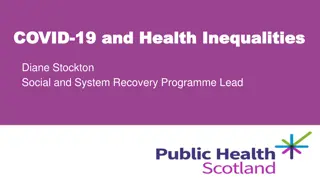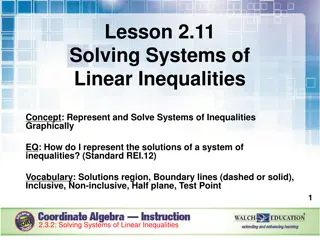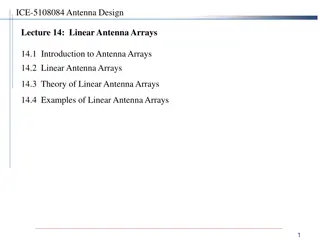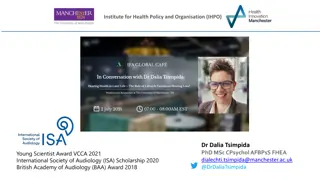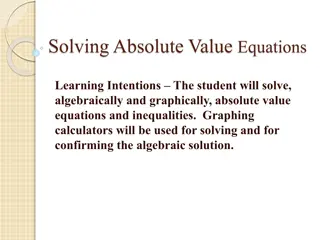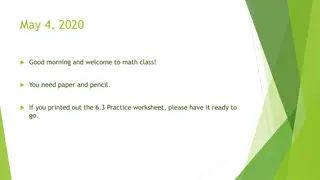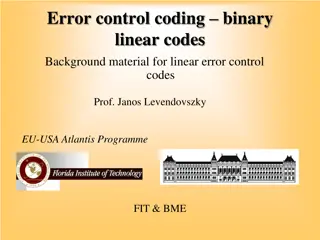Health Inequalities a partnership approach
Explore the collaborative efforts led by Liz Gaulton, Chief Officer of Population Health and Inequalities, to tackle health disparities in Coventry and Warwickshire. The initiative aims to improve outcomes in population health, reduce inequalities, enhance productivity, and support broader social an
3 views • 11 slides
Addressing Health Inequalities Through Partnership Approaches in Coventry
Explore how a partnership approach led by Liz Gaulton, Chief Officer of Population Health and Inequalities in Coventry and Warwickshire, aims to improve outcomes in population health, tackle inequalities, and enhance productivity. Discover the impact of wider determinants of health and the role of t
3 views • 11 slides
Progress in Prevention and Health Inequalities - Annual Report 2023-24
The Prevention and Health Inequalities Team at BOB ICB is dedicated to enhancing prevention efforts and reducing health inequalities across their population and communities. Key achievements include setting up inpatient and maternity tobacco dependency treatment services, establishing prevention net
0 views • 14 slides
Linear Discrimination for Classification
Linear discrimination is a method for classifying data where examples from one class are separable from others. It involves using linear models or high-order functions like quadratic to map inputs to class separable spaces. This approach can be further categorized as class-based or boundary-based, e
3 views • 37 slides
Decision Analysis and Operations Research in Management
This content delves into Management Decision Analysis and Operations Research techniques such as Linear Programming, Integer Linear Programming, Dynamic Programming, Nonlinear Programming, and Network Programming. It covers the phases of an Operations Research study, mathematical modeling for decisi
0 views • 36 slides
Just Transition to Clean Mobility: Addressing Transport Poverty and Inequalities in the Energy Crisis
The European Parliament discusses the urgent need for a just transition to clean mobility to tackle transport poverty and inequalities amidst the energy crisis. Bela Galgoczi emphasizes the multidimensional nature of environmental, climate, and social inequalities, urging for comprehensive policies
1 views • 8 slides
Linear Reservoir Baseflow Method
The linear reservoir baseflow method utilizes linear reservoirs to simulate the movement of water infiltrated into the soil. This method models water movement from the land surface to the stream network by integrating a linear relationship between storage and discharge. Users can select from one, tw
0 views • 11 slides
Linear Transformations and Matrices in Mathematics
Linear transformations play a crucial role in the study of vector spaces and matrices. They involve mapping vectors from one space to another while maintaining certain properties. This summary covers the introduction to linear transformations, the kernel and range of a transformation, matrices for l
1 views • 85 slides
Linear Programming: An Introduction to Optimization
Linear programming, introduced by mathematician George B. Dantzig in 1947, is a mathematical technique for optimizing resource allocation in a systematic manner. It involves formulating linear relationships among variables to achieve desired results like cost minimization or profit maximization. Lin
2 views • 60 slides
Overview of Linear Regression in Machine Learning
Linear regression is a fundamental concept in machine learning where a line or plane is fitted to a set of points to model the input-output relationship. It discusses fitting linear models, transforming inputs for nonlinear relationships, and parameter estimation via calculus. The simplest linear re
0 views • 14 slides
Addressing Inequalities in Physical Activity: Summary of Evidence
This report highlights research by the University of Derby on inequalities in physical activity among different demographic groups. Findings show disparities in PA levels that require immediate action to address. Health is influenced by various factors, including genetics, lifestyle, environment, ac
0 views • 19 slides
Comprehensive Overview of Numerical Linear Algebra Methods for Solving Linear Systems
Explore numerical linear algebra techniques for solving linear systems of equations, including direct and iterative methods. Delve into topics like Gaussian elimination, LU factorization, band solvers, sparse solvers, iterative techniques, and more. Gain insights into basic iterative methods, error
6 views • 12 slides
Formulation of Linear Programming Problems in Decision Making
Linear Programming is a mathematical technique used to optimize resource allocation and achieve specific objectives in decision-making. The nature of Linear Programming problems includes product-mix and blending problems, with components like decision variables and constraints. Various terminologies
1 views • 14 slides
Linear Programming: A Tool for Optimizing Business Operations
Explore the application of linear programming in business, as exemplified by the case study of San Miguel Corporation. Learn how linear programming models can help maximize profits, optimize resource allocation, and streamline decision-making processes in various industries. Discover the fundamental
1 views • 19 slides
Linear Algebra Summary and Solutions
This content delves into the concept of spans in linear algebra, discussing vector sets, generating sets, linear combinations, and solution spaces. It explores the span of vectors, linear independence, and the existence of solutions in a system of equations. The visual aids provided help in understa
0 views • 9 slides
Inequalities Through Writing, Solving, and Graphing
Delve into the world of inequalities with this lesson, where you will learn to write and solve one-step inequalities for both mathematical and real-world scenarios. By the end, you will be able to graph the solutions on number lines, enhancing your understanding of this fundamental concept in mathem
3 views • 116 slides
Solving Linear Equations and Inequalities in Two Variables
Learn how to solve linear equations and inequalities in two variables by graphing them on a coordinate plane. Understand the steps for graphing inequalities, including determining solid or dashed lines and shading above or below the line. Explore examples and tips for shading regions correctly to fi
0 views • 25 slides
Overview of Sparse Linear Solvers and Gaussian Elimination
Exploring Sparse Linear Solvers and Gaussian Elimination methods in solving systems of linear equations, emphasizing strategies, numerical stability considerations, and the unique approach of Sparse Gaussian Elimination. Topics include iterative and direct methods, factorization, matrix-vector multi
0 views • 35 slides
Linear Dependent and Independent Vectors
In linear algebra, when exploring systems of linear equations and vector sets, it is crucial to distinguish between linear dependent and independent vectors. Linear dependence occurs when one vector can be expressed as a combination of others, leading to various solutions or lack thereof in the give
0 views • 20 slides
Health Inequalities in Jordan: Social Determinants and Priorities
This study by Dr. Hoda Rashad in Jordan explores health inequalities and their social determinants, analyzing 85 health indicators in various categories like child health, non-communicable diseases, reproductive health, and health system performance. Key findings reveal progress in child mortality,
1 views • 24 slides
Examples of Data Analysis Techniques and Linear Regression Models
In these examples, we explore data analysis techniques and linear regression models using scatter plots, linear functions, and residual calculations. We analyze the trends in recorded music sales, antibiotic levels in the body, and predicted values in a linear regression model. The concepts of slope
0 views • 11 slides
A Faster Algorithm for Linear Programming and the Maximum Flow Problem
A comprehensive overview of a new algorithm for linear programming and the maximum flow problem developed by Yin Tat Lee and Aaron Sidford from MIT and Simons. The algorithm aims to improve efficiency by reducing the number of iterations required to reach the optimal solution. It discusses the histo
0 views • 40 slides
The Oldest Applications of Linear Algebra in Ancient Civilizations
Linear algebra has roots in ancient civilizations like Egypt, where mathematical problems related to land measurement, resource distribution, and taxation were solved using techniques like Gaussian elimination and Cramer's Rule. The Rhind Papyrus from 1650 B.C. contains examples of linear systems an
0 views • 30 slides
Linear Function Modeling in Snowy Tree Cricket Chirp Rates
Based on the book "Functions, Data, and Models" by S.P. Gordon and F.S. Gordon, this presentation discusses how to model the chirp rate of snowy tree crickets in relation to temperature using linear functions. It covers finding the linear function, interpreting the slope and intercept, determining d
0 views • 13 slides
Breakdown: Linear-time and Field-agnostic SNARKs for R1CS
Breakdown discusses linear-time and field-agnostic SNARKs for R1CS, focusing on achieving fast prover speeds and supporting circuits over arbitrary finite fields. SNARKs offer efficient proof systems with sub-linear proof sizes and verification costs. The work aims to eliminate the need for FFT-frie
0 views • 28 slides
Converting Left Linear Grammar to Right Linear Grammar
Learn about linear grammars, left linear grammars, and right linear grammars. Discover why left linear grammars are considered complex and how right linear grammars offer a simpler solution. Explore the process of converting a left linear grammar to a right linear grammar using a specific algorithm.
0 views • 44 slides
Linear Programming for Recreational Site Planning
Learn about linear programming applied to recreational site planning with a specific case study involving Nature Connection and their allocation of forested wilderness and sightseeing park areas. Explore the components of linear programming models, steps in setting up a linear program, and the formu
0 views • 36 slides
Linear Optimization in MS&E 214
Linear optimization involves maximizing or minimizing a linear function subject to constraints. This week's focus in MS&E 214 is on linear programming, basic feasible solutions, duality theory, and extreme point solutions. The concept of linear programs, such as the example of maximizing x + 3y subj
0 views • 36 slides
Linear Inequalities in Two Variables
Explore the concept of linear inequalities in two variables through graphing and modeling real-world situations. Learn how to identify solutions, graph inequalities, and determine shading direction. Practice problems and visual examples enhance understanding of these mathematical concepts.
0 views • 19 slides
Compound Inequalities: Solve, Graph, and Interpret
Explore compound inequalities, learn to solve them step by step, graph the solutions, and grasp the concepts of "and" and "or" in the context of mathematics. Practice solving and graphing various compound inequalities for a clearer understanding of how they work.
0 views • 26 slides
Adapting Linear Hashing for Flash Memory Constrained Embedded Devices
This research explores the adaptation of linear hashing for improved data handling on flash memory-constrained embedded devices. Motivated by the increasing data collection by IoT devices, the study focuses on implementing database structures like a linear hash table for efficient data processing. T
0 views • 67 slides
Introduction to Inequalities: Understanding Mathematical Relationships
Explore the concept of inequalities through a Halloween-themed math lesson. Understand how inequalities differ from equations and learn to graph inequalities on a number line. Discover how to interpret and solve inequalities, gaining insight into the relationship between two quantities.
0 views • 18 slides
Linear Functions in Mathematics
Linear functions play a crucial role in mathematics, focusing on elements like rate of change and initial value. Through examples involving daily car rental costs and profit from selling birdhouses, this content explores the concept of linear functions and how they are applied in real-life scenarios
0 views • 13 slides
COVID-19 Impact on Health Inequalities
This presentation delves into the intersection of COVID-19 and health inequalities, particularly focusing on disparities in Scotland. It highlights data on emergency admissions, socio-economic factors, and vulnerable groups disproportionately affected by the pandemic. The discussion explores causes
0 views • 27 slides
Solving Systems of Linear Inequalities Graphically
Learn how to graph and solve systems of linear inequalities by representing solutions graphically. Understand concepts like solution region, boundary lines, inclusive and non-inclusive, and how to use test points to verify solutions. Follow step-by-step instructions to graph a system of inequalities
0 views • 19 slides
Linear Antenna Arrays: Theory and Applications
Introduction to linear antenna arrays, including the concept of distributing radiating elements, combining array elements for specific beam characteristics, and the theory behind linear antenna arrays. Exploring the benefits of linear arrays in obtaining narrow beams, fan beams, and scanning capabil
0 views • 20 slides
Research on Hearing Health Inequalities: Insights from Dr. Dalia Tsimpida
Dr. Dalia Tsimpida, a renowned researcher in the field of audiology, has conducted comprehensive studies on hearing health inequalities, regional patterns of hearing loss in England, and the implications for health policy. Her work includes developing a Conceptual Model of Hearing Health Inequalitie
0 views • 5 slides
Absolute Value Equations and Inequalities
In this lesson, students will learn to solve absolute value equations and inequalities both algebraically and graphically. The concept of absolute value, which represents the distance between a number and zero on the number line, is explained through examples and solutions. The importance of using g
0 views • 43 slides
Linear and Nonlinear Functions in Mathematics
Explore the concepts of linear and nonlinear functions in mathematics through identifying linear and nonlinear functions from graphs, understanding the characteristics of linear functions, and identifying linear functions from tables. Learn about the constant rate of change, slope, and how to determ
0 views • 49 slides
Linear Error Control Coding and Syndrome Detection in Binary Linear Codes
Delve into the world of linear error control coding, guided by Prof. Janos Levendovszky, as we explore the development of linear codes, message vectors, error groups, and the process of selecting group leaders with detailed examples. Discover how syndrome detection and decoding tables play a crucial
0 views • 27 slides


